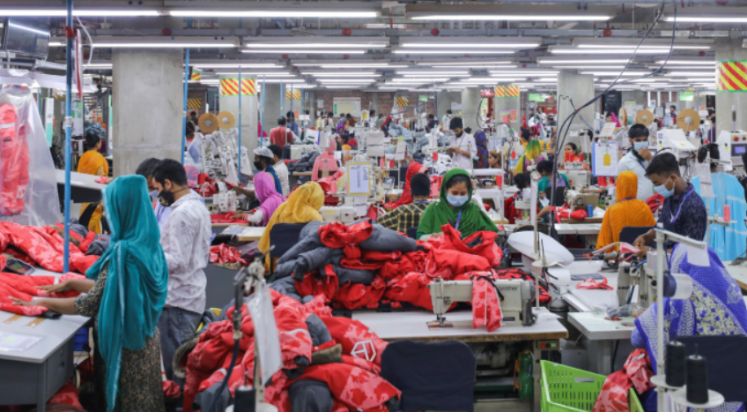
Bangladesh’s readymade garment (RMG) sector recorded a 15% decrease in net exports during the April-June quarter of FY ’25, primarily due to uncertainties stemming from US tariff announcements, a nationwide strike by the National Board of Revenue (NBR), India’s restrictions on land-port RMG imports, and sluggish global demand.
According to a recent report from Bangladesh Bank, the country’s net RMG exports, calculated by subtracting the value of imported raw materials from export earnings, declined to US $ 5.17 billion in the quarter, representing 56.78% of gross RMG exports, down from US $ 6.09 billion (58.90%) in the previous quarter. Total RMG export earnings for April-June stood at US $ 9.12 billion, marking an 11.92% decrease from US $ 10.35 billion in the January-March period. Despite the quarter-on-quarter decline, the earnings were still 3.15% higher than the same period last year.
Key markets for Bangladeshi garments during this period included the United States, Germany, the UK, Spain, France, the Netherlands, Italy, Canada, and Belgium, collectively accounting for nearly 72% of total RMG exports with US $ 6.55 billion.
The report highlights that global economic headwinds, coupled with domestic challenges such as rising production costs and limited diversification of export markets, contributed to the volatile export trend. The US’s recent imposition of a 50% reciprocal tariff on Indian goods and increased tariffs on Chinese products, with indications of further hikes, are prompting shifts in sourcing patterns worldwide. Exporters suggest that buyers may now increasingly turn to Bangladesh and Vietnam to avoid high tariffs, potentially reducing sourcing costs by nearly 30%.
Mahmud Hasan Khan Babu, president of the Bangladesh Garment Manufacturers and Exporters Association (BGMEA), emphasized the sector’s readiness to capitalize on this shift, stating, “Apparel buyers may now look to Bangladesh and Vietnam to avoid the high costs of sourcing from India and China. We must be prepared for this opportunity.”
However, exporters caution that domestic challenges, including a gas crisis, political instability, port congestion, banking sector issues, and the need for a more investment-friendly environment, must be addressed to fully harness this potential.
Mohammad Hatem, president of the Bangladesh Knitwear Manufacturers and Exporters Association (BKMEA), echoed these sentiments, underscoring the importance of domestic reforms alongside adapting to global market changes.
As the sector navigates these complex dynamics, stakeholders remain optimistic about Bangladesh’s prospects to regain and expand its share in the global garment market amid shifting international tariffs and economic uncertainties.






